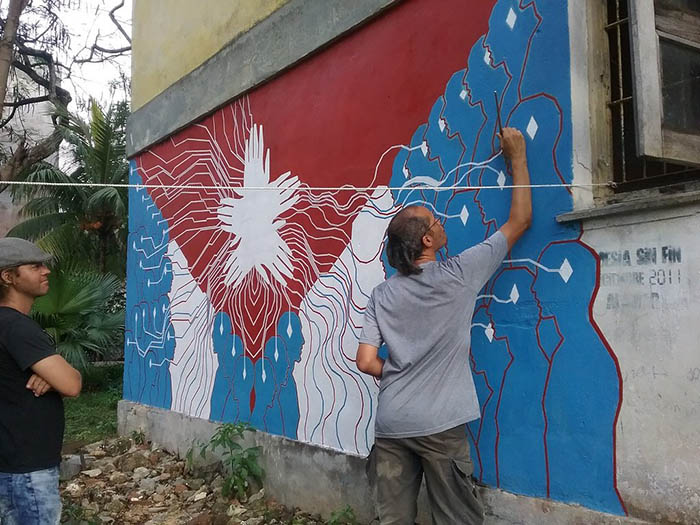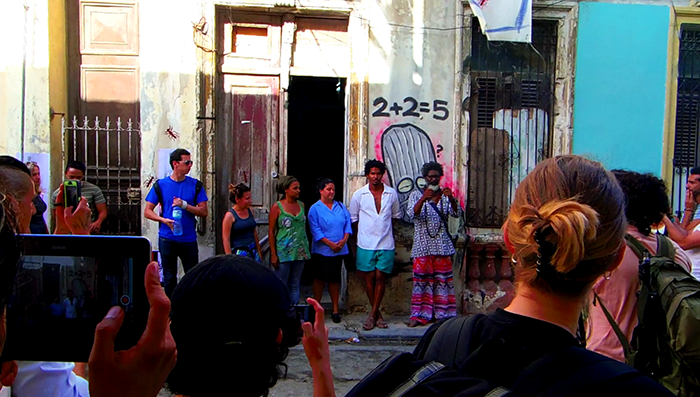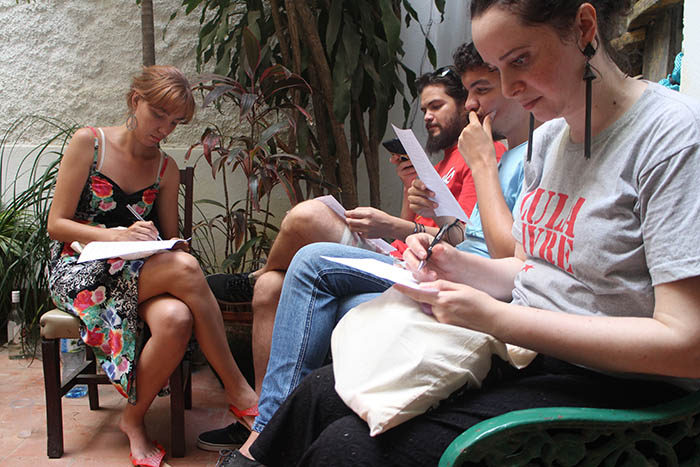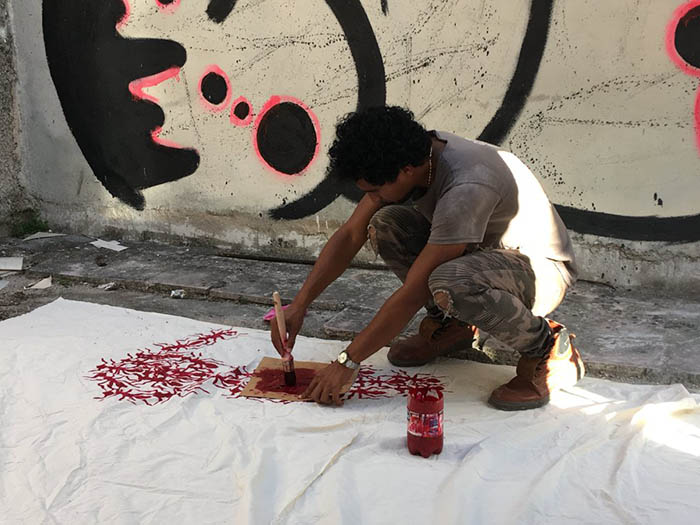11 Jun 2018 | Awards, Fellowship, Fellowship 2018, Honduras, News
[vc_row][vc_column][vc_single_image image=”100749″ img_size=”full”][vc_column_text]Two days after the publication of an investigation into alleged inappropriate behaviour by a member of a Honduran military unit involving young female students, digital newspaper Reportero de Investigacion was targeted with a misleading story that purported to be from the outlet.
The news outlet, which was founded by 2018 Freedom of Expression Awards Fellowship winner Wendy Funes, had posted an 8 June 2018 article which exposed how members of a military unit were going into schools, teaching children without parental consent or notification, collecting personal information and, in at least one case, texting sexually harassing messages under the guise of the “No Drugs, Live Better” programme. The Reportero de Investigacion article included screenshots of a text conversation between a mother and a military officer. The officer thought they were texting the woman’s daughter.
The publication drew a large amount of the attention in Honduras, which is one of the world’s most dangerous places to be a journalist.
Two days later, a faked article began appearing that used the Reportero de Investigacion logo and included screenshots from gang members who discussed the difficulties of distributing drugs, claiming they had less access after the military had begun its in-school training programme. The false article is being shared on WhatsApp groups among members of the law enforcement community in Honduras, Funes told Index on Censorship.
This is not the first time that fake news stories have been circulated in Honduras to discredit the work of investigative journalists and human rights activists and undermine their personal security.
For Funes, it is vital that the appropriate government agencies investigate these false publications. She said she will be addressing a complaint to the new Honduran Special Prosecutor for the Protection of Human Rights Defenders, Journalists, Social Communicators and Justice Operators, (FEPRODDHH), which has the responsibility for determining where the faked article purporting to be from reporterosdeinvestigación.com came from.
“For us it is necessary to carry out an investigation, although we do not have the certainty that it is a smear campaign against our newspaper, we believe that an investigation is urgent to determine the origin of the messages and the State has the tools necessary to do it.” Funes said.
Perla Hinojosa, fellowships and advocacy officer at Index on Censorship said: “It’s important to call out efforts to discredit the investigative work of journalists like Wendy. Even though this was not a direct physical threat, the spread of false information undermines Wendy’s news organisation, which seeks justice and identifies human rights abuses.”[/vc_column_text][/vc_column][/vc_row][vc_row][vc_column][vc_basic_grid post_type=”post” max_items=”12″ style=”load-more” items_per_page=”4″ element_width=”6″ grid_id=”vc_gid:1528734389898-5507b00f-068d-2″ taxonomies=”23255″][/vc_column][/vc_row]
8 Jun 2018 | Americas, Artistic Freedom, Awards, Cuba, Fellowship, Fellowship 2018, News
[vc_row][vc_column][vc_column_text]

Cuban artist Yasser Castellanos
Despite official efforts to stop it in its tracks, Cuba saw the successful completion of its first independent art biennial, organised without the support of the state, on 15 May. Artist Luis Manuel Otero Alcantara and curator Yanelys Nuñez Leyva, members of the Museum of Dissidence, winner of the 2018 Index on Censorship Freedom of Expression Award for art, organised the ten-day #00Bienal de la Habana, which included over 170 artists, writers, musicians and theorists across nine different exhibitions in artists’ homes and studios around the country’s capital.
“Cuban culture is centralised culture and the government has absolute control,” Nuñez Leyva tells Index on Censorship. “The Ministry of Culture, together with all its branches such as the Union of Writers and Artists of Cuba and the National Council of Plastic Arts, are tentacles of the Ministry of the Interior, so all independent proposals, whether cultural, ecological or campaigns against gender violence, for example, are cursed with all the might of the government-controlled media.”
Even at schools pupils are served up propaganda intent on turning them against non-state-approved artists. Some art school students were shown a video portraying Otero Alcantara as a mercenary. “Such a campaign inevitably generates fear around independent projects which then suffer due to lack of both social and economic support,” Nuñez Leyva says.

Economic support was one of the biggest obstacles for #00Bienal. “At the beginning, we thought that we would produce it with what we had at hand, but along the way we realised that we needed more,” Nuñez Leyva says. So a Gofundme campaign was set up, which raised $6,574. “But this wasn’t easy: the impact of the US blockade, our isolation from the world of networks and the impossibility of having credit cards made the process anguishing.”
Otero Alcantara was also imprisoned without cause on several occasions as part of the Cuban government’s campaign of harassment. Others who took part in #00Bienal, whether Cuban or foreign, received similar harassment. Many were even denied entry to the country, including the Cuban-American artist Coco Fusco.
When #00Biennial was announced in September 2017, the Cuban government immediately began to show its discontent through its cultural institutions. In an official declaration they branded the organisers as “unscrupulous people”. In response, #00Bienal’s first slogan was: “From the official to the unscrupulous.”
As culture is so tightly controlled in Cuba, only artists seen to be working in the interests of the regime can operate without restriction. Approved artists usually receive perks, something that gives them a higher status in society. Some artists risked all of this by taking part in #00Bienal. “The system used the worst blackmail against them because they gave the event a legitimacy that the government did not want,” Otero Alcantara says. “These artists were threatened by having their government accreditation taken away. Without this, they would find themselves without ‘official work’.”

Government agents stalked the exhibitions while the organisers were accused of being in league with Cuba’s enemies. How does one respond to such accusations? “We responded by making an event that is as honest as possible, with a wide range of manifestations and artistic expressions that reflected the reality of Cuban art,” Nuñez Leyva says. “We responded with a list of more than 170 participants, not only Cubans, but from Mexico, Spain, Germany, the United States, Romania, Angola, Colombia, Denmark, Ukraine, Brazil, Venezuela, among them high-profile artists that Cuban institutions admire and collaborated with.”
The authorities even tried to prohibit the public from attending, sometimes successfully. Flyers and stickers were also confiscated. “But none of these actions were ever going to stop the energy of the event,” Otero Alcantara says.
“Despite all this pressure, the event went ahead, demonstrating that there is a group of people who are very courageous and have a real commitment culture,” Nuñez Leyva says. #00Bienal helped revive “a spirit of alternative rebellion” through the involvement of “countless numbers of totally unknown artists” that the state would never endorse.
For Otero Alcantara, the event’s success lies in the cohesion it created between artists, scholars and art enthusiasts, something that is unprecedented in the world of Cuban art. “We built an inclusive space of free creation and true collaboration between the people involved, exhibited the work of artists who were never going to have space in an official Havana Biennial and set a precedent for future projects,” he says. “This is one more step towards eliminating a fear that exists throughout Cuba.”

According to the organisers, the terms “revolution” or “revolutionary” have been hijacked and distorted by the Cuban regime. Such deformation has taken root so deep in the imagination of the Cuban people that just by mentioning the word “dissidence” is enough to be shunned, they explain.
“The #00Bienal was a humanistic project that brought to the fore essential values for any society such as unity, solidarity and collaboration,” Nuñez Leyva says. “The event also favoured the less privileged and created beauty and dialogue in favour of a new Cuba.”
The organisers of #00Bienal are under no illusions that life for Cuba’a dissident artists will magically become any easier under Cuba’s new president, Miguel Díaz‑Canel, who took over from Raúl Castro in April 2018. “The Cuban regime is more than any Castro,” Nuñez Leyva says. “It is a system based on a group of families that live both inside and outside the island, who have control over everything, which ultimately contributes to their own wealth.” This corrupt system relies on the deception of a people who have been left without even the strength even to protect themselves against poverty, she adds. “This situation leaves us with little hope, but we have to keep working.”
Otero Alcantara and Nuñez Leyva’s now want to show that #00Bienal wasn’t just a one-off, but is a serious project with longevity. “We will see if it is possible in two years to achieve something similar,” Otero Alcantara says.[/vc_column_text][/vc_column][/vc_row][vc_row][vc_column][vc_media_grid grid_id=”vc_gid:1528443291288-dfd45bff-0a16-7″ include=”100716,100712,100711,100710,100713,100709,100708,100707,100706,100704,100715,100705″][/vc_column][/vc_row][vc_row][vc_column][vc_column_text]
Artists, writers, musicians and theorists who took part in #00Bienal
Amaury Pacheco (Cuba), Iris Ruiz (Cuba), Coco Fusco (Cuba-USA), Tania Bruguera (Cuba), Reynier Leyva Novo (Cuba), Ernesto Oroza (Cuba), Gerardo Mosquera (Cuba), Katherine Bisquet (Cuba), Jose Ernesto Alonso, Yuri Obregón (Cuba), Alein Somonte (Cuba), Alejandro Barreras (Cuba), Anaeli Ibarra (Cuba), Alejandro Taquechel (Cuba), Ariel Maceo Tellez (Cuba), Aryam (Cuba), Aldeide Delgado (Cuba), Armando Cuspinera (Mexico), Antonio Mas (Spain), Alicia Torres (Spain), Ana Olema (Cuba), Alexis Ruiseco (Cuba-USA), Alexandru Raevschi (Germany), Andrés X (Cuba), Alain Aspiolea (Cuba), Alexandre Arrechea (Cuba), Antoni Muntadas (Spain), Biennial Project (USA), Boris González Arenas (Cuba), Colectivo Corason i uevo (Antonio A. Orta, Maykel Almenteros y Pedro Pablo Bacallao) (Cuba), Colectivo Guerrillas Girls, Celia y Yunior (Cuba), Colectivo 2.50 (Ana Gómez, Argelia Leodegarío, Marco Antonio Rodríguez, Itandehuitl Orta, Yuvia Pérez, Esmeralda Pérez) (Mexico), Carlos Manuel Álvarez (Cuba), Clara Astiasarán, Chu (Cuba), David de Omni, David León (Cuba), Danilo Maldonado (El Sexto), Diego Gil (Spain), Eliecer Jiménez Almeida (Cuba), Erish (Mexico), El Oficio (Cuba), Ernesto Hernandez Busto, Enfori García, Filipa César (Portugal), Fabián (2+2 =5) (Cuba), Francis Sánchez (Cuba), Francisco Méndez (Mexico), Francisco Masó (Cuba), Fabian Martínez, Filio Gálvez, Fredric Snitzer, Gabriel Coto (Cuba), Gerardo Stübing (España), Gean Moreno, Henri Eric Hernández (Cuba), Hamlet Lavastida (Cuba), Héctor Trujillo (Cuba), Hugo Patao, Italo Expósito (Cuba), Iván de la Nuez (Cuba), Jesús Hdez-Güero (Cuba), Jesús Benítez (Mexico), José Luis Marrero (Cuba), Josvan Gonzalez Agramonte (Cuba), Julián Yunda Yepes (Mexico), Jenifer Acuña (Cuba), Juan Melo (Colombia), Juan Carlos Alvarez Miranda (Cuba), Jean-Lorin Sterian (Romania), José Bedia (Cuba), Julio César Llopiz (Cuba), Javier Marimón, José Manuel Mesías (Cuba), Keyezua (Angola), Kevin Arrow, Lía Villares (Cuba), Luis Trápaga (Cuba), Luiso, Leandro Villanueva (Sam 33) (Cuba), Lester Dubé (Cuba), Lala Misosniky (Romania), La Alianza (Cuba), Liliam Dooley, Leandro Feal (Cuba), Lourdes Porrata, Miquel García (Spain), Marisol Maza (Mexico), Marcel Marquez (Cuba), Marianna Liosi (Germany), MO colectivo (Mariam Abrajim y Octavio Salazar) (Colombia), Magdiel Aspillaga, Mysora García, Nonardo Perea (Cuba), Natalia López (Colombia), Osmel Almaguer Delgado (Cuba), Osmany Carratalá (Cuba), Oscar Salamanca (Colombia), Orlando Hernández (Cuba), Pablo Pinto (Colombia), Polyanna Morgana (Brazil), Political Architecture: Critical Sustainability (PA:CS) (Denmark), Peter Menéndez, Rafael Carabano (Venezuela), Raúl Meriño (Cuba), Ras Yoe, Ricardo Figueredo, Rodolfo Peraza (Cuba), Rafael Domenech, Rirkrit Tiravanija, Svitlana Biedarieva (Ukraine), Soandry del Río (Cuba), Sandra Ceballos (Cuba), Santiago Alvarez Méndez (Colombia), Sandor (Cuba), Thiago Morandi (Brazil), Tomás Sánchez (Cuba), Tomas Vu, Tonel (Cuba), unx Pardo Ibarra (Colombia), Ulises Valdés (Mexico), Walfrido Valera (Cuba), Yaima Pardo (Cuba), Yasser Castellanos (Cuba), Yesica Suárez (Colombia), Yulier P. (Cuba), Yoenis Eloy Mayeta (Cuba), Yimi Konclase (Cuba), Yvelin Buenrostro (Mexico), Yucef Merhi (Venezuela), Yornel Martínez (Cuba), Yali Romagoza (Cuba), Yanier H. Palao (Cuba).[/vc_column_text][/vc_column][/vc_row][vc_row][vc_column][vc_basic_grid post_type=”post” max_items=”4″ element_width=”6″ grid_id=”vc_gid:1528443291296-0ad2c295-a239-7″ taxonomies=”104″][/vc_column][/vc_row]
14 May 2018 | Campaigns -- Featured, Press Releases
[vc_row][vc_column][vc_column_text]Freedom of expression organisation Index on Censorship calls on Egypt to immediately release activist Amal Fathy, who was detained by police last Friday.
Fathy was arrested alongside her husband Mohamed Lotfy, director of the award-winning human rights organisation, the Egyptian Commission for Rights and Freedoms. Police raided the couple’s home in Cairo at 2.30 a.m. and took them and their 3-year-old child to the police station. Security officers searched their house, their mobile phones were seized and they were denied the right to communicate with a lawyer or family.
Lotfy and their child were released after three hours but Fathy has been ordered to remain in detention for 15 days on “on charges of incitement to overthrow the ruling system, publishing lies and misusing social media”.
On Wednesday, Fathy posted a video on her Facebook page in which she spoke about the prevalence of sexual harassment in Egypt, criticizing the government’s failure to protect women. She also criticised the government for deteriorating human rights, socioeconomic conditions and public services.
Rachael Jolley, editor of Index on Censorship, said: “This is just the latest attempt by the Egyptian government to stop the public being informed about what is going in their country. The authorities must release Amal Fathy immediately.”
Fathy’s husband is co-founder of the Egyptian Commission for Rights and Freedoms (ECRF). ECRF, a 2018 winner of an Index on Censorship Freedom of Expression award, works on documenting cases concerning torture in prisons and enforced disappearance in an increasingly difficult climate in Egypt where independent voices are suppressed and threatened.
For more information, please contact Jodie Ginsberg at [email protected][/vc_column_text][/vc_column][/vc_row][vc_row][vc_column][vc_basic_grid post_type=”post” max_items=”12″ style=”load-more” items_per_page=”4″ element_width=”6″ grid_id=”vc_gid:1526299869862-1ce8ff4a-0268-2″ taxonomies=”147, 24135″][/vc_column][/vc_row]
11 May 2018 | Campaigns -- Featured, Egypt, Statements
[vc_row][vc_column][vc_column_text]Egyptian security forces have targeted one of the last human rights organisations in the country, the Egyptian Commission for Rights and Freedoms, by detaining executive director Mohamed Lotfy with his wife, Amal Fathy, and their two-year-old-son.
Security officers searched their house, their mobile phones were seized and they were denied the right to communicate with a lawyer or family.
ECRF, a 2018 winner of an Index on Censorship Freedom of Expression award, works on documenting cases concerning torture in prisons and enforced disappearance in an increasingly difficult climate in Egypt where independent voices are suppressed and threatened.
Rachael Jolley, editor of Index on Censorship, said: “It is shocking how the lives of people who are working to make public information about torture in Egyptian prisons and other human rights violations are being threatened. Obviously the intention of this action, and others, is to stop the incredibly brave members of staff at this organisation carrying on with their important work. Index calls on governments around the world to put pressure on Egypt to release Amal Fathy and to shine a spotlight on the Egyptian government’s frightening tactics to stop the public knowing what is going on in that country.”
Authoritarian governments are increasing using arrest, detention or threats to family members to stop human rights activists carrying on with their work.
Lotfy and his son have been released, however his wife Amal Fathy remains in detention. Fathy has been ordered detained for a 15 days by the prosecution.
#الحرية_لأمل_فتحي
#Free_Amal_Fathy
#ECRF[/vc_column_text][/vc_column][/vc_row][vc_row][vc_column][vc_basic_grid post_type=”post” max_items=”12″ style=”load-more” items_per_page=”4″ element_width=”6″ grid_id=”vc_gid:1545211672482-eba4610a-2b33-8″ taxonomies=”24136, 24135″][/vc_column][/vc_row]




